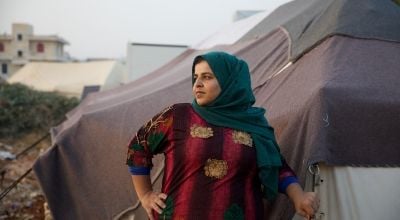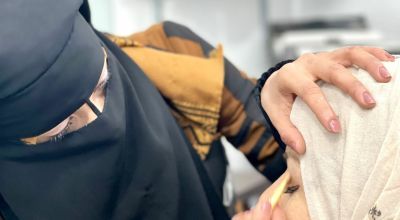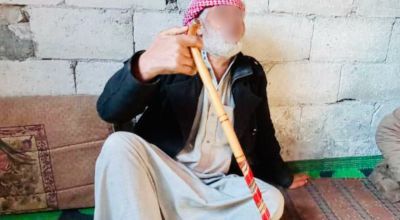
Read our 2024 annual report

Knowledge Hub
Syrian voices on International Women's Day
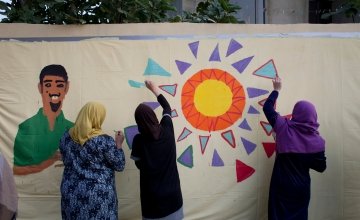
A daughter, a mother, a grandmother. Women exiled from Syria and struggling to cope in Lebanon. Three among the millions devastated by the Syria crisis. This International Women’s Day (IWD), let them tell you their stories.
Syrian women in Lebanon
Over 1 million Syrians, a quarter of them women, are registered as refugees in Lebanon. After five years of influx, the country is struggling to handle this growing community. Similarly, the refugees are nearing the end of their coping capacities.
Reduced support from the UN, due to dire underfunding from the international community, has left 70% of refugees living below the Lebanese poverty line. Meanwhile, the new criteria and high costs now attached to residence permits make them extremely difficult to secure.
These pressures are combining to create a climate in which women refugees, especially those who head their households, are at risk of violence, harassment and exploitation. They are struggling to meet the high cost of living and to find the money to buy food and to pay rent. Amid the poverty and desperation, these women also become increasingly vulnerable to domestic violence.
Three generations of Syrian women, coping with the bleak reality of life as a refugee in Lebanon, tell their stories:
A daughter
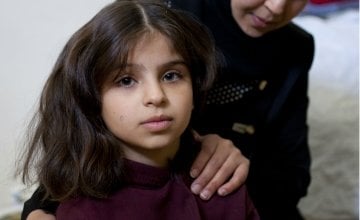
I never thought I would bring children into the world and that they would become refugees.
Khadiya* was only three years old when the war in Syria began. As the violence escalated, her family made its escape to Lebanon. But not before the conflict left its mark on Khadiya – before fleeing she experienced a bomb attack that stunned her small body into a kind of paralysis, as her mother, Haya*, explained: “She stopped walking after a bombing raid in Syria. I think she was so frightened, it’s as though she lost the confidence to walk forwards and face the future.”
At eight years old, Khadiya still has problems standing up.
Life in Lebanon
The stress of life as a perpetual refugee in Lebanon has also taken its toll on Khadiya. Her home is now a cramped two-roomed flat with her four siblings and parents as well as three other families. The crowded and tense atmosphere, compounded no doubt by memories of the war, is so heightened that her mother began tearing out her own hair. Watching her mother in despair, Khadiya started doing the same.
It got so much with the tension at home that I started pulling out my hair. It was the only thing that calmed me down.
Haya is now receiving counselling and support from a local Concern partner, Basmeh and Zeitooneh, and taking an embroidery class which gives her both a creative outlet and an opportunity to earn a living. She finds the sessions therapeutic and no longer pulls out her hair. She tells us, “I feel comfortable with the other women in the class. We share our stories and somehow it gives us the strength to keep going.”
A mother
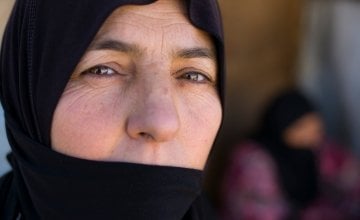
Fatme* is a mother to seven girls and three boys. Ten young children that she smuggled out of Syria following the bombing of their home. Ten children that she is now forced to raise alone in Lebanon following the death of her husband.
She and her children live in a tented settlement perched along the Mediterranean coast in northern Lebanon. Its neat appearance complete with flowerboxes and a gravel pathway belie the horror that its residents have seen. Most refugees arrived two years ago after fleeing death, mutilation, and destruction in Syria. They have lived in this tented limbo ever since.
Fatme, like many of the women gathered here, has no shortage of nightmarish anecdotes. However as a mother, seeing her children maimed by violence must surely be the hardest to bear.
A missile hit my son in the arm and now there are no bones [in his forearm]. His legs were scarred by shrapnel, there’s even shrapnel in his eyes.
Longing for home
The discomfort, instability and relentlessness of life here also dominate Fatme’s thoughts. While Lebanon has provided a safe haven for her and her neighbours, their lives here have been far from easy. Formal camps are not allowed here, making it difficult to provide facilities like clean water and sanitation. Syrian refugees are not allowed to take jobs, so are left to survive on handouts and occasional work as labourers.
Fatme desperately longs for her old life.
It is not nice staying here. The cold, the heat, the wind… the water is not clean and we are always sick. I swear we haven’t felt well since we left Syria.
All she wants is to be able to go back to Syria and restart her life. While Fatme and millions of other refugees wait for the war to end, Concern is working to ensure that living conditions in Lebanon are bearable. We’re distributing essentials for the winter and helping to improve the quality of their living accommodation.
A grandmother
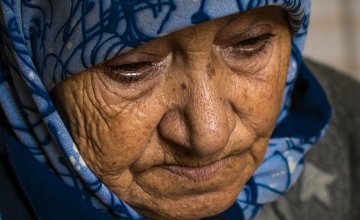
Like the stories of Khadiya and Fatme, Iman’s* tale is reminiscent of a hellish nightmare. But it is true and represents the tragedy of what has happened to every generation of women caught up in the crisis.
Iman speaks fondly of life before the war: “We had land with olives and 60 sheep. We had a home, we were very happy. I was sick and my daughter brought me to hospital. I wasn’t at my village when they came.”
Who “they” were is not clear and to a certain extent doesn’t really matter. Much of Syria is now overrun by a wide variety of combatants with different aims and objectives. But it’s the ordinary women, children and men who have suffered. What they took from Iman is difficult to comprehend.
They killed my husband, my sons and daughters, my grandchildren and even two cousins. All of them were killed. 21 of them in all.
The only people in Iman’s family to escape death were the daughter who had brought her to hospital and one grandson, who was away studying in college at the time of the massacre. The three of them fled to Lebanon in 2014. Her daughter has since gone back to Syria and her grandson remains in Lebanon but has not recovered from the trauma of what happened.
Alone in Lebanon
Iman now lives alone in a concrete garage on a commercial street in Akkar province. A shelter team from Concern Worldwide has installed toilet and washing facilities and helped to make the space weatherproof and warm. But this life is not what anyone would wish for an elderly woman who has experienced so much.
Iman is in constant pain with leg problems and can’t move around easily. She relies on the help and kindness of others. Much of her time is spent sitting at the door of her makeshift home and reflecting on what has happened to her.
I never got the chance to get back to my home – never got back to my village. I am sick and alone and I need help.
Concern support
Concern has been in Lebanon since 2013, working to help women like Khadiya, Fatme and Iman in a range of different ways – from improving their immediate living conditions to helping them cope with trauma and stress.
Before the harsh Lebanese winter hits, we distribute essentials like warm winter clothes, tarpaulins, stoves, blankets, fuel vouchers and repair kits. We also work with families and individuals like Iman to help improve the quality of their living accommodation with building materials and technical support for renovations.
We are supporting communities to build a safe environment for Syrian women. Our protection programme, funded by Irish Aid, involves men in projects to prevent and respond to protection issues, such as gender-based violence. Meanwhile, with local partners like Basmeh and Zeitooneh in northern Lebanon we are providing vital support to women like Haya through workshop sessions to help empower women who have no other outlet for their stress and despair.
* All names have been changed for security purposes
Support Concern's work
You can help improve the lives girls and women in crisis like Khadiya, Fatme and Iman by supporting our work around the world.



